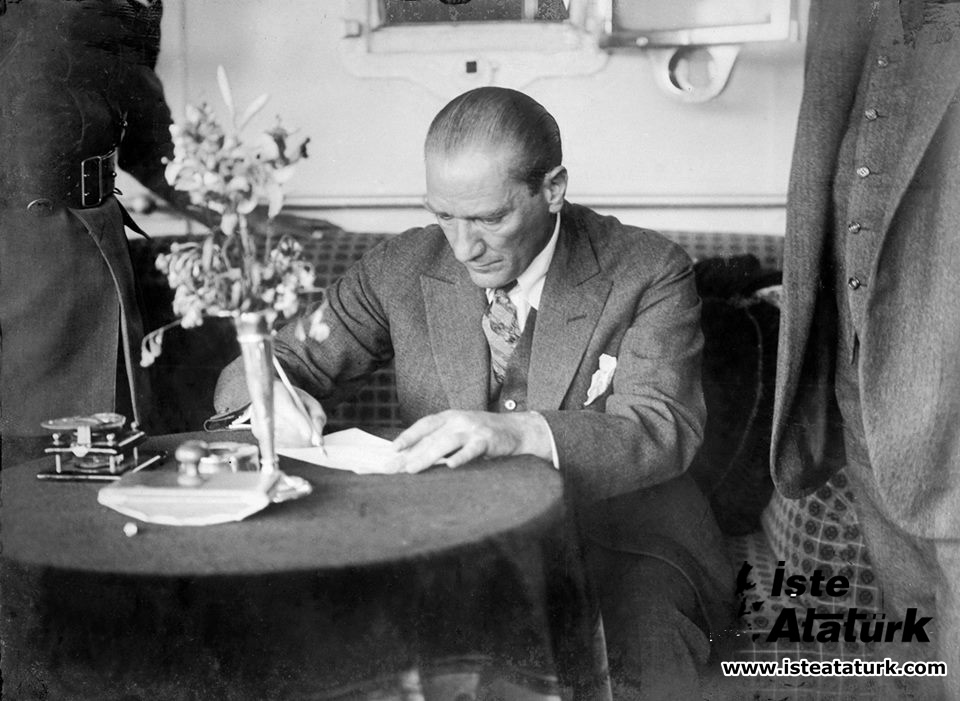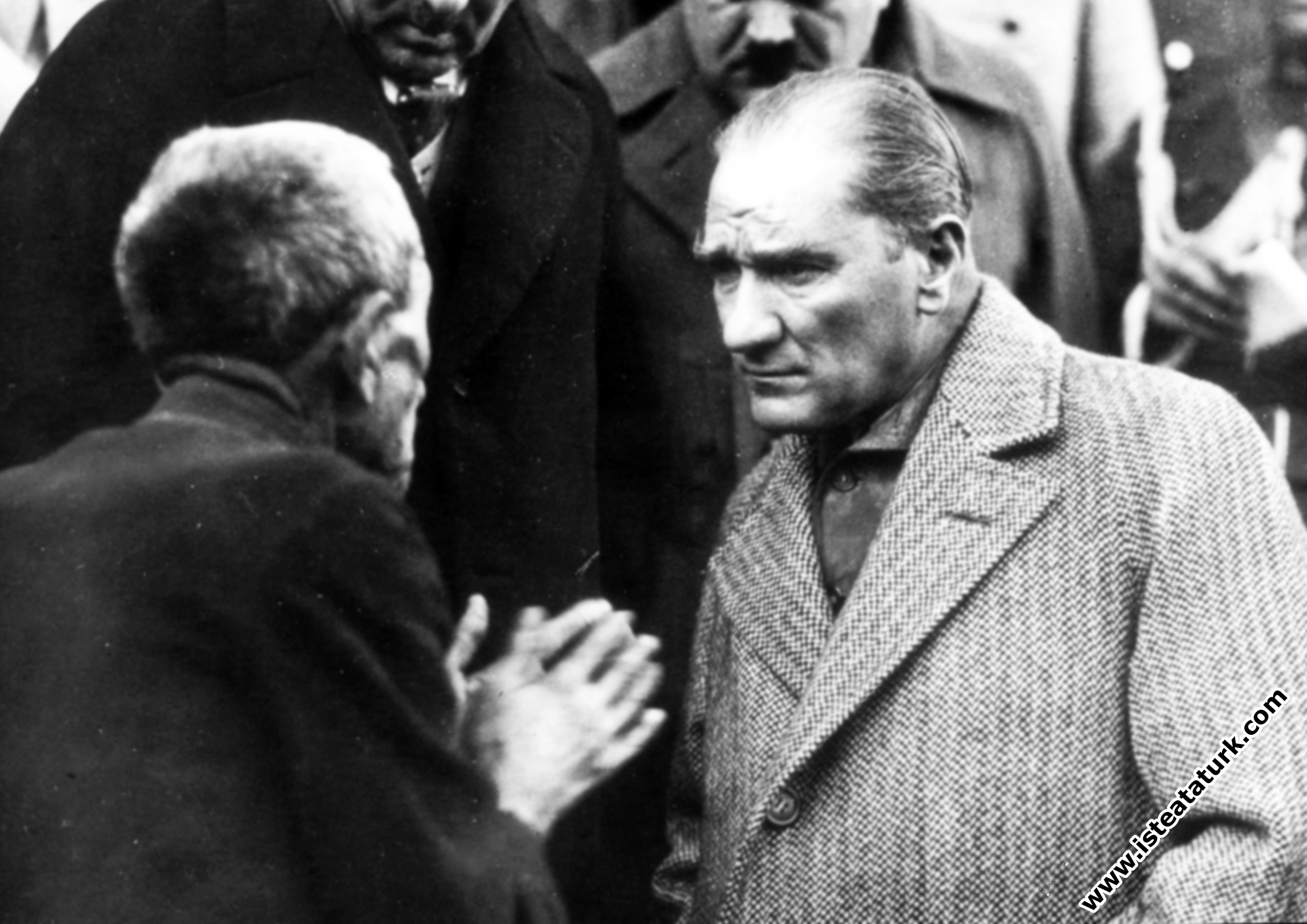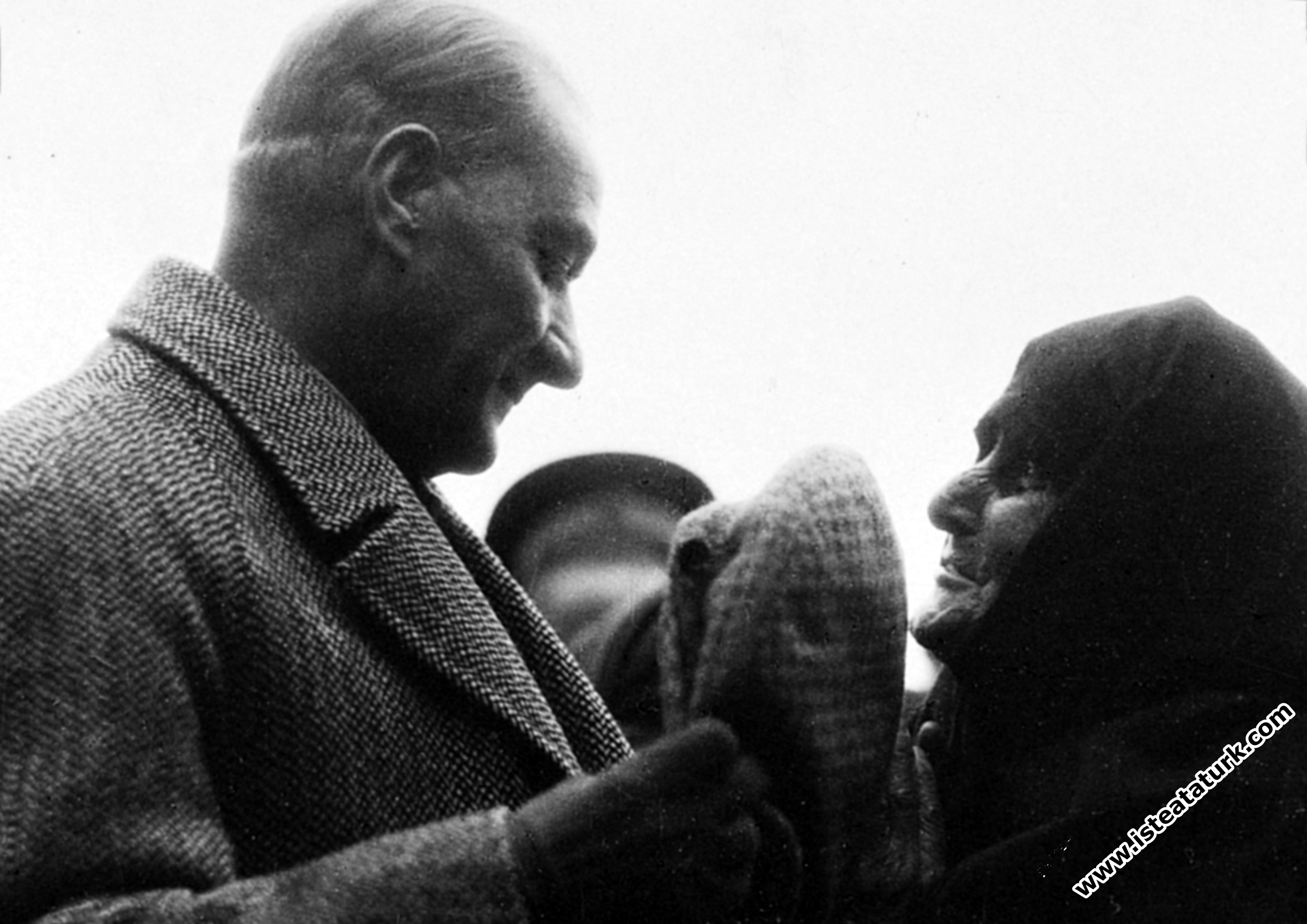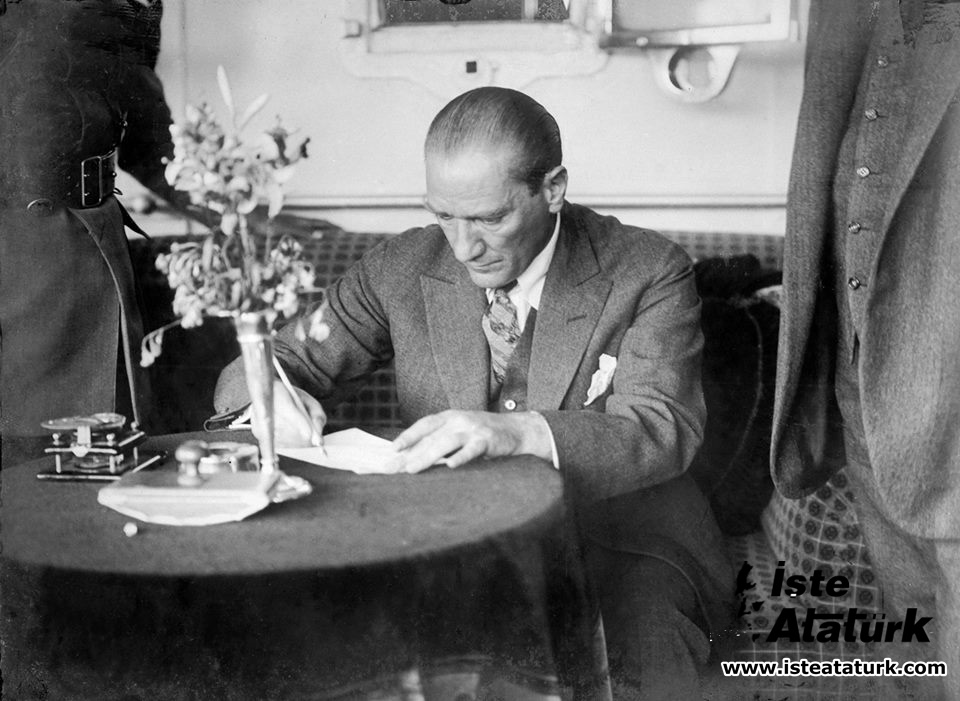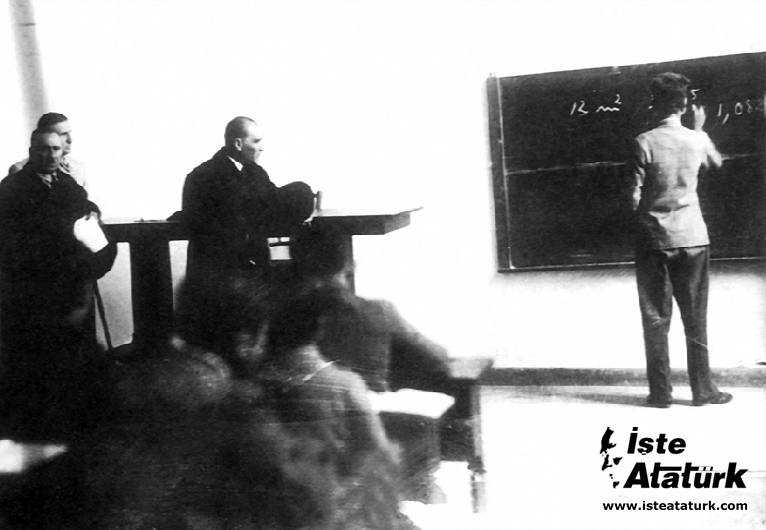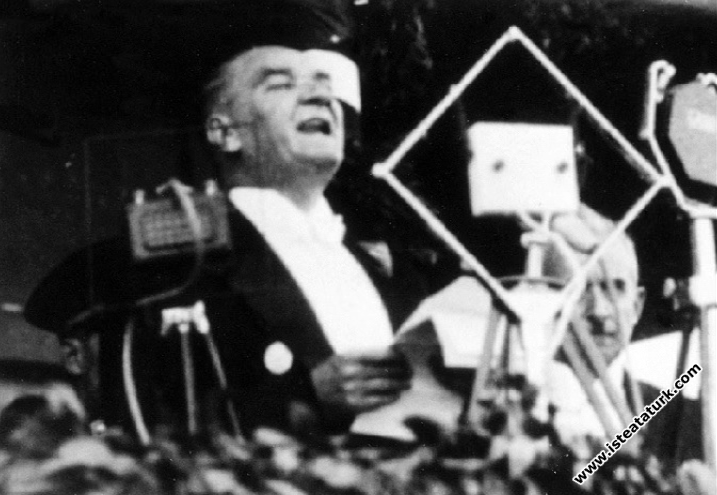
Nation and Turkish Nationalism According to Atatürk
Character Size
“The society that consists of people who have a rich memory heritage, who have a common desire to live together and who are sincere in the future, and who have a common will to continue the protection of the owned heritage, is called a nation.” Mustafa Kemal Atatürk
NATION AND TURKISH NATIONALISM ACCORDING TO ATATÜRK
Millet is an Arabic word and its plural is milel. It is the equivalent of "budun" in our historical sources and "nation" in western languages. However, the word millet was not used in its present meaning at the beginning. Instead, the word "ummah" was used. According to Şemseddin Sami, the word millet was incorrectly used instead of ummah, and the word ummet was used for millet1.
The great Turkish thinker and scientist Ziya Gökalp gave the words nation and ummah their current meanings. According to him, “all of the people of the same religion are called ummah. Therefore, all Muslims are an ummah. The nation group, which is common only in language and culture, is something different from this2. On the other hand, the word budun is a developed concept that meets today's nation. The word “bod” in the old Turks meant an independent, illi, and khanate Turkish society. According to the old Turks, who thought of the nation as the main founder and owner of the state, “Turkish Sir Budun” meant the united Turkish nation3.
The word millet was used for non-Muslim communities in the Ottoman Empire, and all Muslims were counted as an ummah, taking the name "Ummet-i Muhammed". Millet was used to refer to Greeks, Armenians and Jews, not in terms of ethnicity, but in terms of religious communities4.
Ziya Gökalp was the first to describe the nation in Turkey with its current meaning. According to him, a nation is “a community consisting of individuals who have a common language, religion, morality and sense of beauty, that is, individuals who have received the same education”. “People want to live with people with whom they have common language and religion, rather than people with whom they have a common hook. Because our human personality is not in our body, but in our soul”5.
We encounter a similar description in the 1931 program of the Republican People's Party: “Nation is a political and social entity formed by citizens who are bound to each other by language, culture and ideal unity”6.
In Ziya Gökalp's definition, there is no "desire to live together" with the "country", and there is no "religion" element in the party's program. Following the adoption of the principle of secularism, as a result of the amendment made in the 1924 Constitution with the law numbered 1222 and dated 1928, the expression "The religion of the State of Turkey is Islam..." in the second article states "The official language of the State of Turkey is Turkish, office is the city of Ankara”. The Republic of Turkey has now become a secular country. The majority of the people living in the country are Muslims, and there are also non-Muslim elements such as Greeks, Armenians, Jews and Assyrians, albeit very few. These elements were accepted as Turkish citizens because they "feeled Turkish". Every individual who is a Turkish citizen in Turkey equally benefits from the rights and freedoms provided by the Constitution,
Mustafa Kemal Atatürk's definition of the nation is as follows: "The society that consists of people who have a rich memory heritage, who have a common desire to live together and who are sincere in their will, and who have a common will to continue the preservation of the heritage, is called the nation"8. The natural and historical formations that are seen to be effective in its establishment are as follows; unity in political existence, unity of language, unity of homeland, unity of race and origin, historical proximity and moral closeness.
Our homeland is the homeland within our borders today, where the Turkish nation lives with its artifacts preserved in the depths of its ancient and high historical lands. The Turkish homeland is very important for the Turkish nation. Atatürk gave meaning to the concept of homeland in this Turkish homeland, the borders of which were kneaded and drawn with the blood of the last Turkish generations. “Homeland, may everything be sacrificed for you. Blessed are you, we are all sacrifices for you. But you will remain virtuous to keep the Turkish nation alive forever. Turkish land, you are not the grave of the Turkish nation that loves you. Show your creativity for the Turkish nation”9.
According to the rules of our language, there is no fundamental difference between nation and nationality. Just as “seriousness” is used to mean being serious in Turkish, “milliyet” should mean being national, that is, being a member of a nation10.
Nationality is the bond of citizenship that binds the individual to the nation state in terms of law. Sociologically, it is the feeling of belonging to the same species. In nature, the bee lives with the bee, the ant with the ant, and the pigeon with the pigeon. It is the instinct that attracts animals towards their own kind and searches for members of their own kind. In man, this instinct takes the form of a national feeling11.
National sentiment is one of the deep elements of social psychology. Therefore, it constitutes one of the most rooted principles of modern international law. Indeed, contemporary international law is based on the “principle of nationalities” and sees nationality as a condition for independence. According to this principle, every nation has the right to live independently as a state within its own national borders. Since in our time a nation's policy of subordinating non-self groups and communities to itself by force and domination has failed, today the criterion that divides people into separate state communities is nationality.
One of the principles that we call Atatürk's principles, which determines the characteristics of the Republic of Turkey, which is the last link of the eternal Turkish state, is nationalism, perhaps the most important one. Atatürk's revolution has two unchanging principles. The first of these is nationalism, the second is civilizationism. “The root of civilization connects us to the European method, thought and culture, and the root of nationalism leads us to our Central Asian and Eastern resources, our history and our linguistic unity”12.
Nationality is a natural bond that binds the individual to his national group and arises from the feeling of belonging to the same nation type. In its pure sense, nationalism means loving and sanctifying national things in order to raise awareness and strengthen this natural bond. As nationalism in this sense is new in Europe, it is newer in our country. It emerged with the idea of national sovereignty in the years of the Second Constitutional Monarchy13.
Nationalism, at the same time, does not only affect international politics and does not exceed the belief and purpose that members of the same nation should establish a national state in the country of origin. “This aim, which is known as the principle of self-determination of nations in our time, has played an important role in changing the world political map. Nationalism in our time unites human communities into a strong whole in the hands of the modern state.
According to Atatürk, the principle of nationality is the condition that a nation has natural or acquired special characteristics in relation to other nations, that it constitutes a different unit from other nations, and that it works for development in parallel with them, mostly apart from them.
According to this principle, every individual and every nation has the right and freedom to have good intentions about themselves and to claim possession of their lands without reservation. This motto easily shows us which nations are free and which are deprived of their freedom in one way or another, and whether they are worthy of the name of a sudden nation15.
According to Atatürk, Turkish nationalism has preserved the special characteristics of the Turkish social committee and its own independent identity, while walking parallel to and in harmony with all contemporary nations, on the path of progress and development, and in international contacts and relations16.
Mustafa Kemal Atatürk is a Turkish nationalist. In the report he wrote on May 22, 1919, he aimed at national unity, national sovereignty and Turkish feeling. The first goal is for the Turkish nation to gain independence in Turkey. The natural and historical ties in the formation of the Turkish nation, the unity of language, historical memories, common character in moral customs and traditions, the conditions of unity in the homeland and political existence, and all of these are present in the Turkish nation. The national unity formed by individuals with a common cultural heritage is strengthened by the ties of all these elements. In Atatürk's words, we can use the phrase “How happy is the one who says I am a Turk” as an expression of our national identity17.
Mentioning how Soviet Russia, which was closely interested in the Turkish War of Independence in terms of its own ideological interests during the National Struggle, exploited the national awakening and national independence movements of the nations, Mustafa Kemal said, “A perfect exploiting the mentality of the awakened eastern nations, caressing their national passions and knowing how to provoke their grudges. Bolsheviks have become the main force threatening not only Europe but also Asia18”, he emphasizes the importance of the nexus of nationality in the continuation of the lives of the nations. “In order for the nation to survive, the common bond (common bond) that it thought among its members changed its form and nature for centuries, that is, the nation gathered its members with the Turkish nationality connection instead of religious and sectarian contact”19.
According to Mustafa Kemal, the principle of nationality is a principle that should be given great care in order to protect our Turkishness. “The principle of nationality, which is modern, has been generalized internationally. We will also take great care to preserve our Turkishness. Turks are noble in civilization”20.
The most important of the foundations of the New Turkish State is nationalism. Nationalism liberated many nations today from captivity and brought them into their own national sovereignty. Turkey has also passed this stage. Mustafa Kemâl means “The New Turkish State is the manifestation in Turkey of that mighty idea (nationalism) that dominates the world, it is the realization21”.
The greatest future of the Republic of Turkey will undoubtedly be the Turkish youth. In this respect, it is necessary for the Turkish youth to receive a national education and to be equipped with national feelings, so that the Turkish nation and its great state do not fall into the whirlpool of danger and bow before any nation. Mustafa Kemal is so sensitive about the education and training that will be given to our children that his words are the most obvious evidence of this: "While our children and young people are being raised, it is necessary to fight against all kinds of foreign elements that conflict with their existence, right and unity, and the need to struggle with the efkar-ı milliye, the kemal. The necessity of vigorous and self-sacrificing defense against every opposing idea should be encouraged. It is important to instill these qualities and abilities in all the spirit of the new generation”22.
“Sirs, our children and young people who will grow up should be taught that it is necessary to fight against all anasir, which is hostile to Turkey's independence, its own self, and its nationality, regardless of the boundaries of their education. There is no life and independence for individuals and societies composed of individuals with such characteristics who are not equipped with the elements that such a struggle would make necessary according to the international situation of the world”23. In another speech, he said, “Whatever the limits of education we will give to our children and young people, we will basically teach them the following: 1. The nation, 2. The State of Turkey 3. The Turkish Grand National Assembly, the need to fight against those who are enemies. Nations that are not equipped with the means and means of this struggle have no right to live. Struggle is necessary”24.
Mustafa Kemal Atatürk was born at a time when the nationalist movement had shaken all the empires, including the Ottoman Empire, and his foundations were cracked, and he had very strong and solid thoughts by personally experiencing and observing the most important stages of his life, those events that developed. He did not compliment any of the remedies (such as Islamism, Ottomanism, Pan-Turkism) considered for the continuation of the existence of the Ottoman Empire, and he never approved the negative attitudes of the Ottoman government officials towards Turkish nationalism. Turkish nationalism must be strengthened so that our salvation is possible. What happened to the Turkish nation is because the feeling of nationalism could not be an action movement. Mustafa Kemal has the following to say on this subject: “We are a nation that has been very late and very lazy in implementing the ideas of nationality. You know that the theories that are working on the nationality theory, the nation's ideal, have no more ability to apply in the world. Our nation has seen the harsh punishments of neglecting its nationality. Various tribes within the Ottoman Empire always embraced national creeds and saved themselves with the strength of the national ideal. We understood what we were when we were expelled from them with a stick. We understood that our fault was forgetting ourselves”25. Various tribes within the Ottoman Empire always embraced national creeds and saved themselves with the strength of the national ideal. We understood what we were when we were expelled from them with a stick. We understood that our fault was forgetting ourselves”25. Various tribes within the Ottoman Empire always embraced national creeds and saved themselves with the strength of the national ideal. We understood what we were when we were expelled from them with a stick. We understood that our fault was forgetting ourselves”25.
Turkish Hearths were established with the aim of reviving the ideal of Turkishness and putting it into action. It was a very important task for the Turkish Hearths to explain the Turkishness movement to the Turkish nation, to reveal the Turkish culture by researching and to inform the nation about it. In this connection, Mustafa Kemal said, "Turkish Hearths should have a significant impact on the nation's culture26".
While drawing the boundaries of the policy they followed, Mustafa Kemal was saying in August 1920: “Our point of view is that of populism, that the power, dominance and administration should be given directly to the people, should be kept in the hands of the people. There is no doubt that this is the strongest principle in the world. Of course, such a principle does not contradict Bolshevik principles. They call us nationalists though. But we are such a nationalist that we respect and obey all nations that join us. We recognize the requirements of all their nationalities. Our nationalism is not at all selfish and arrogant. Especially since we are Islam, from the point of view of Islam, we have our ummatism.
While explaining the purpose of the establishment of the Turkish Grand National Assembly, Mustafa Kemâl also states the following: “If the aim is to ensure the independence of the whole nation within our border, this is the only purpose, and if this is analyzed, the doctor will attack on the basis of communism. Look, we are talking about the border of the national... But communism does not know any borders. In Halkubi, we consider a national border. Then we are talking about independence. Possibly communism considers freedom as necessary. We cannot accept that either. The government's policy is an open policy. It is based on the general delegation of the nation. Otherwise, there is no one who is based on this or that group or party”28.
Mustafa Kemal's field of nationalism is Turkey, whose borders are determined by the National Pact. The sole purpose is to cultivate and prosper the lands within these borders and to increase the welfare and happiness of the people living on these lands. “We are people who know their place. We do not have ambitions that cannot be realized. Today, we have many co-religionists groaning under the agony of captivity. It is one of our greatest wishes for them to work for the prosperity and advancement of their country with independence in their own circles”29.
For our compatriots living outside our present borders, Mustafa Kemal appears as the owner of a positive thought. We pointed out that he never adopted a policy aiming to gather all Turks under one flag, and that he considered it impossible to implement such a policy. But it is her greatest wish. He told Azerbaijan's ambassador to Ankara in October 1921: “Because the problems of the Azeri Turks are like our own and their joys are like our own joys, we are very happy that they can achieve their wishes and live independently. Your statement that the Azerbaijani Turks are ready to shed their blood for the sake of Turkish happiness and the liberation of the oppressed is a very valuable statement that increases the strength of the Turks and the oppressed against the invaders”30. Outside our present borders, in other hands, The situation of the Turkish communities, who willingly or unwillingly shared fate with other political groups, and who have a unity of language, race and origin with us, have close and distant histories and moral affinities, is “a result of a thousand and one events in history and is a sad memory for Turkish nations. However, the historical and scientific formation of the Turkish nation can never violate the nobility and solidarity”31.
The Republic of Turkey is the only independent state of Turkishness until the dissolution of the Soviet Union in 1991 and it must always be strong and strong. If this happens, it will be able to continue to be the biggest guarantee for its compatriots who have to live here and there in the world. “Lords, if a nation does not deal with all its strength, thought and material for its existence and law, if a nation does not ensure its existence and independence based on its own strength, it cannot escape being the basis of this and that”32. The duty of the statesmen, who have undertaken the administration of the nation, is as important as the nation's involvement with all its might for its own existence and law. “The men who lead and administer the nations, of course, first of all want to be the agents of the existence and happiness of their own nation.
Unless the principles on which Turkish nationalism is based are known, it becomes impossible to interpret. Turkish nationalism is built on solid foundations, one of which is the Turkish Nation.
Turkish Nation According to Atatürk
It is a political and social committee composed of citizens connected to each other by the unity of nation, language, culture and ideal. “The Turkish people who founded the Turkish Republic are called the Turkish nation”34.
There is no nation in the world that is older or cleaner than it. It has not been seen in the entire history of mankind. Let's look at today's Turkish nation as if we were looking at a painting and think with the help of the knowledge we have gained so far. Let's say what we see in this table, what this table reminds us of, one by one:
1- The Turkish nation is a state governed by the republic, which is the people's administration.
2- The Turkish nation is secular. Every adult is free to choose his religion.
Article 68 of the Teşkilat-ı Esasiye Law states: “Every Turk is born free and lives free”35. Article 54 of the 1961 Constitution and Article 66 of the 1982 Constitution states that "Everyone who is bound to the Turkish state by citizenship is a Turk36".
For Mustafa Kemal, the Turkish nation is the main source of everything. “There is no love as great as the love of the nation. I think there were some services I rendered to my nation in the War of Independence. But I didn't own any of them. Everything that is done is the work of the nation. If it is to be sought, this is the truth. We cannot claim that we have done all the things we have to do to prove that we are the children of a race and nation that has established countless civilizations in the past... My advice to my friends is this: Let's work together not for your own person, but for the nation we belong to. This is the biggest study37”.
In a speech he made on March 26, 1937, Mustafa Kemal explained the source of his power in the National Struggle as follows: “The day I landed in Samsun in May 1919, I had no material strength in my hands. There was only a high and spiritual power that was born from the nobility of the Great Turkish nation and filled my conscience. I started to work by trusting this national force, this Turkish nation. I was so sure that one day a sun would inevitably rise from the Turkish horizon, that its movement and strength would warm us and that it would give us strength, I was seeing it with my own eyes”38.
“All the commendation that has been given to the high command and police officers of the heroic Turkish armies, and to the devoted soldiers of the heroic Turkish armies, and finally to the great Turkish nation, who is the mother, father and benefactor of all these heroes, rather than myself. I am also proud and happy to be a member of this glorious army, a son of the great Turkish nation, and to be present for his service”39.
According to Mustafa Kemal, the Turkish nation will continue to exist from eternity to eternity. He himself has always been at the forefront in the last life and death struggle of the Turkish nation. This conviction was strengthened on the battlefields. In his speech with the members of the Afyon Municipal Council in March 1923: “After so many tremors, after so many centuries of destruction, our nation, despite the endless poverty, found success once again, stood up again with perseverance and faith, instead of the new Turkish State, instead of the disobedient Ottoman State. If there has been an act of existence, it has come from the fact that our nation has its own law, its own freedom, its own identity, its law, and its march with interests other than national goals. As long as our nation walks on the same path, we should have no doubt that it will truly last forever”40.
Atatürk is the lover of independence and freedom. After saying that Freedom and Independence is my character, he said, “I am a man infatuated with the love of independence, which is one of the most precious laws of my nation and my great ancestors... It is solid with its possession... I must remain a child of an independent nation in order to live. For this reason, I think national independence is a matter of life… I am the ruthless enemy of any nation that wants to enslave my nation, until they give up on these goals”41. According to him, the Turkish nation is a nation that does not accept captivity. “It is the nation itself that makes the National Struggle. In the National Struggle, the sons of the nation struggled not with personal ambition, but with the motive of national ideal, national self-esteem”42. At the tea ceremony held in honor of Claude Ferrere on June 18, 1922, “Gentlemen, the people of Turkey are the heroic sons of a nation that has lived free and independent for centuries and considered independence a necessity for life. This nation has not lived without independence, cannot and will not live”43.
The Tenth Year Speech is very important in terms of revealing the essence of Mustafa Kemal's nationalism. This speech, which embraces the whole Turkish nation, unites them and advises them to act around common ideals, is exactly as follows:
“Turkish Nation
We are in the fifteenth year that we started the War of Independence. Today is the day of celebration of the tenth anniversary of our republic.
Congratulations.
At this moment, as a member of the Great Turkish Nation, I am in the deepest joy and excitement of meeting this blessed day.
My compatriots,
We made great and lots of things in such a short time. The biggest of these works is the Republic of Turkey, which is based on Turkish heroism and high Turkish culture.
We owe our success in this to the resolute march of the Turkish nation and its valuable army.
But we never see enough of what we do. Because we have to do more and bigger things and we are determined. We will raise our country to the level of the most prosperous and civilized countries in the world. We will raise our national culture above the contemporary level of civilization.
For this reason, we think that the measure of time should not be considered according to the relaxing mentality of the centuries, but according to the notion of speed and movement of our century. Relative to the last time, we will try more. We will accomplish greater things in less time. There is no doubt that we will succeed in this. Because: The character of the Turkish nation is high. Turkish people are hardworking. Turkish people are smart. Because the Turkish nation knew how to overcome difficulties with national unity and solidarity. And because the torch that the Turkish nation holds in its hands and minds on the way to progress and civilization is positive science. I should also emphasize that one of the historical characteristics of the Turkish nation, which is a high human society, is to love the fine arts and to rise in it. For this reason, our nation's high character, invincible industriousness, intellectual intelligence, devotion to science, love for fine arts,
This ideal, which is very beneficial to the Turkish nation, will enable it to fulfill its own civilized duty to ensure genuine peace for all humanity.
Great Turkish nation, you have heard my words promising success in the works we have undertaken for fifteen years. I am happy that in none of my words I have suffered a misstep that would shake the confidence of my nation in it.
Today, I say with the same faith and certainty that the entire civilized world will soon recognize once again that the Turkish nation, which is marching towards the national ideal with complete integrity, is a great nation. I have no doubt that the forgotten great civility and great civilized ability of Turkishness will rise like a new sun on the high civilization horizon of horse with its further development.
Turkish nation, I sincerely wish you to celebrate this great nation's holiday with greater honors, happiness, peace and prosperity in every ten years that flow into eternity.
How happy is the one who says I am a Turk!”44
1 Şemseddin Sami, Kâmûs-ı Türkî, Çağrı Published, Istanbul, 1978, p. 1400.
2 Ziya Gokalp, Principles of Turkism, MEB Temel Eser, Istanbul 1970, p. 20.
3 Bahaeddin Ögel, Development Ages of Turkish Culture, 2 volumes, MEB 1000 Basic Works, Istanbul, 1971, Volume One, no: 49, p. 42.
4 Bernard Lewis, The Birth of Modern Turkey, Trans. Metin Kıratlı, TTK publication Ankara 1970,
5 Gokalp, supra, p. 22.
6 Uriel Heyd, Ziya Gokalp's Life and Works, Ter. Cemil Meriç Sebil Publications, Istanbul 1980, p. 44.
7 Zeki Mesud Alsan, State Law Lessons, School of Political Sciences Publication, Ankara 1947, p. 161.
8 Afet İnan, Civil Information and M. Kemal Atatürk's Handwriting, TTK Ankara 1969, .p. 23:24.
9 Afet Inan, What I Wrote From M. Kemal Ataturk, MEB 1000 Basic Works, Istanbul, 1971, p. 107-108.
10 Mehmed İzzet, Theories of Nationality and National Life, Ötüken Publishing House, Istanbul 1969, p. 15.
11 Ali Fuad Başgil, “Main Organization Law Lessons, Vol. 1, Ankara 1943, p. 144.
12 Peyami Safa, Turkish Revolution Perspectives, Ministry of Culture Publication, Ankara 1981, p. 85.
13 Ali Fuad Başgil, Ibid., p. 146.
14 Ahmet Suat Bilge, International Politics, Faculty of Political Sciences Publication, Ankara 1966, p. 246.
15 Afet Inan, What I Wrote From M. Kemal Ataturk, p. 59.
16 Afet Inan, Civil Information, p. 25.
17 Inan, the Republic of Turkey and the Turkish Revolution, TTK, Publication, Ankara 1977, p. 197.
18 Atatürk, Discourses and Statements, Vol. 3, T.İ. History Institute Publication, Ankara 1981, p. 95.
19 Atatürk, Discourses and Statements, Vol. 2, p. 237
20 Atatürk, Discourses and Statements, Vol. 2, 89.
21 Atatürk, Discourses and Statements, Vol. 1, p. 321.
22 Atatürk, Discourses and Statements, Vol. 2, p. 17.
23 Atatürk, Discourses and Statements, Vol. 2, p. 231.
24 Atatürk, Discourses and Statements, Vol. 2, p. 45.
25 Atatürk, Speeches and Statements, Vol. 2, p. 143.
26 Atatürk, Discourses and Statements, Vol. 2, p. 142.
27 Atatürk, Discourses and Statements, Vol. 1, p. 102.
28 Atatürk, Discourses and Statements, Vol. 1, p. 138.
29 Atatürk, Discourses and Statements, Vol. 2, p. 54.
30 Atatürk, Discourses and Statements, Vol. 2, p. 19.
31 Afet Inan, Civil Information, p. 23.
32 Atatürk, Discourses and Statements, Vol. 2, p. 11th.
33 Atatürk, Discourses and Statements, C. p. 282.
34 Afet Inan, Agc, p. 18.
35 Suna Kili - A. Şeref Gözübüyük, Turkish Constitutional Texts, Türkiye İş Bankası Publishing, Ankara 1985, p. 124.
36 Kili - Gözübüyük, Age, p. 186, 274.
37 Afet Inan, What I Wrote From Mustafa Kemal Ataturk, p. 108.
38 Atatürk, Discourses and Statements, Vol. 2, p. 284.
39 Atatürk, Discourses and Statements, Vol. 2, p. 183.
40 Atatürk, Discourses and Statements, Vol. 2, p. 163.
41 Atatürk, Discourses and Statements, Vol. 3, p. 24.
42 Atatürk, Discourses and Statements, Vol. 2, p. 231.
43 Atatürk, Discourses and Statements, Vol. 2, p. 35.
44 Atatürk, Discourses and Statements, Vol. 2, p. 276.
Prof. Dr. Mustafa Keskin*
*Erciyes University Ataturk's Principles and Revolution History Department
Source: ATATÜRK ARAŞTIRMA MERKEZİ DERGİSİ, Sayı 41, Cilt: XIV, Temmuz 1998
